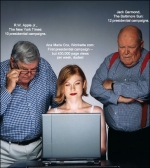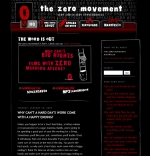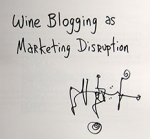George Parker, who writes the Adscam and AdHurl advertising blogs will appear on NBC's Today Show tomorrow, Tuesday, sometime between 7A and 10A. Parker will discuss the impact of the Internet and other newer forms of advertising have affected newspaper advertising effectiveness and revenues. Parker should know what he's talking about as he's been in the business for over 30 years, worked for many agencies and is currently writing a book entitled, "Entrepreneurial Advertising."
"We've pretty much stopped with TV ads or radio ads or branded ads. It just wasn't worth it anymore. Online, there are just many more possibilities." That's a refrain we've hearing more on more over the next few years as marketers realize traditional advertising ain't all it's cracked up to be anymore. Amsterdam Tourism Board Internet manager Sebastian Paauw uttered that phrase when commenting on the Board's deal with BlogAds under which the Board, in connection with BlogAds, will send 25 bloggers to Amsterdam in exchange for ad space on their blogs. While the bloggers are not required to write anything about their trip, bloggers being bloggers, there will, no doubt, be a litany of posts covering their escapades during their five day stay.
The promotion, called "Bloggers in Amsterdam," calls for bloggers to be interviewed by the Tourism Board and provide the Board with one month of advertising on their blogs. The program is an extension of standard industry practices in which travel journalists are given a free ride so they can experience a destination and write about it.
Yesterday we shared our opinion on the Ad-Free Blog movement commenting "until aliens land and introduce an entirely new economic system, advertising will continue to make the world go 'round." Today, the inimitably more adamant Bucky Turco has weighed in on the topic, sending a letter to the folks over at Ad-Free Blog writing, in part, "The whole reason a lot of brands are going online is because they like the openness and frankness which the blogs bring. I mean look at Gawker for Christ sake. Huge blog, lots of advertisers, and their editorial wall is thick like the Great Wall of China. Not to mention it forces brands to come up with quality stuff or they will get slammed, whether they are paying customers or not."
While the effort was not well received within the ad community, there's no doubt the two people behind Ad-Free Blog, Keri Smith and Jeff Pitcher are fine human beings. After all, Smith is an accomplished author and Pitcher is a devoted musician and artist but, as Turco points out, they aren't marketers, "Again it [Ad-Free Blogs] is a good idea for someone who knows nothing about the subject, but the bloggers will definitely call you on your bullshit. Key is keeping up a strict editorial wall and attracting and selecting only cool advertisers that get it. And trust me, plenty of them "get it."
While we might all be uppity over the effort these two have launched, everyone, after all, is entitled to their opinion.
It sure would be nice to live is a world without advertising but until aliens land and introduce an entirely new economic system, advertising will continue to make the world go 'round. We appreciate that there should always be a wall between advertising and editorial but we don't subscribe to the notion that advertising devalues content as do the folks over at Ad-Free Blog. The group places blogs on a pedestal and claims that advertising on blogs devalues the medium. Again, we could go into our tirade about how blogging is just a really easy way to publish a website and not this new uber-religion it's made out to be but will spare you that tired rant.
Contrary to the groups mantra, all blogs should not be ad-free. If all blogs should be ad-free, why not all websites? Why not all media? Why should blogs be held to this artificially higher standard? If the group is so adamant about advertising devaluing blogs, shouldn't they be out trying to stop advertising from devaluing all media? Climb out of the clouds and smell the real world.
It's always a welcome bit of ego-stroking when one finds oneself worthy of consideration. Adrants has been named a contender in AdLand's Battle of the Ad Blogs in the Best Commercial Ad Blog category. We're joined in that category by some other very fine ad blogs including Adhurl, AdJab, AdFreak, MarketingVOX, The Spunker and Fast Company. We're honored to be among such a fine collection of fellow advertising opinionites.
Other categories in the Battle include Best Non English Language Ad Blog, Best Ad-Porn Blog (lots of ad images, not porn images), Best General Ad Commentary, Best Ad Commentary Not From The United States, Best Ad Agency Ad Blog, Best Planner/Teorist Blog, Best School Ad Blog, Best Design Discussion Blog, Best Typography Blog, Best Marketing Blog, Best PR Blog, Best Viral Blog, Best Inspiration Blog, Best Online/Interactive Blog and Best Topical Blog. So go check out all the blogs and give a shout out to your favorite ones.
Online consumer conversation measurement companies BuzzMetrics and Intelliseek, along with its BlogPulse blog prtal, have combined to form one mega-metrics analysis company called Nielsen BuzzMetrics. BuzzMetrics parent company VNU has been on a buying spree lately scooping up linguistics analysis company Trendum, BuzzMetrics and now Intelliseek. With the acquisition, VNU hopes to create "the new global standard for measuring and understanding word-of-mouth behavior and influence."
For those who don't know what these companies do or why you should care, the press release puts it quite succinctly explaining the companies "mine publicly archived online sources including blogs and discussion forums to collect and transform large volumes of unaided conversations into actionable consumer insights." In other words, they find out what people are saying about your brand and they package it up with a nice bow on top for your review.
Adrants is a blog. Do you care? I didn't think so. I bet you come here because there's content you like which is all that really matters. In today's Ad Age, Simon Dumenco wrote a piece entitled A Blogger is Just A Writer With A Cooler Name in which he breaks down the facade that blogging is something other than what it is: just a really easy way to publish a website. We read Dumenco's piece with appreciative glee that someone finally agreed with our position on the topic.
While lots of bloggers (writers as Dumenco defines) seem to get a kick out of sticking it to the man or mainstream media as "the man" is currently defined, all bloggers do when blogging is efficiently publish content and offer commentary on news or another person's opinion and the framework through which they publish that opinion. For some reason, the blog publishing platform has been equated to snarky opinion making which, to some degree, is fair as most blogs don't have editors are are written purposefully to ruffle feathers. But plenty of feathers are ruffled through mainstream media as well.
more »
To appeal to men, many soft drink makers have dropped the word "diet" from the name of their products or introduced newly named products. In Coke's case, there's Coke Zero. A clandestine element of the campaign urging men to consume Coke Zero is a weblog, with no mention of Coke's involvement (Note: apparently in reaction to negativity about this effort, the page is now clearly branded with a Coke Zero bottle), named The Zero Movement on which a guy rants about why life is so full of stuff to do and how it would be so much nicer if there was, well, zero to do. It's written in typical character blog prose, devoid of personality and full of whiny banter which comes off like it's a product of a creative brief. There's even fake, supportive comments to go along with it.
While the blog's archives indicate the site's been up since June, 2005, Whois information tells a very different story. Not only does the information reveal the site is a product of Coke, it clearly states the domain for the site was registered November 21, 2005, a full five months after the site, according to its archives, launched. On top of this, blog monitoring service BlogPulse has little to no information on the blog. Had The Zero Movement blog been pumping out posts since June 2005, BlogPulse would have had a sizeable profile for the site. Blog search engine Technorati, aside from some recent referrals, doesn't have much either. In creating The Zero Movement, Coke has lied, misled and misrepresented. Some would call this reprehensible and irresponsible. We'll just call it stupid.
more »
I'm loathe to cover this or anything else million dollar homepage-related but, now doubt, someone else will and Adrants will have missed the boat. So here we go. Yijun Sun has ported the million dollar homepage concept to the weblog format and plans to sell blog posts by the character.
Surely, this is just another lame, stupid attempt to latch onto the one and only true and successful million dollar homepage but there's this thing with blogs. They seem to find their way into search engine results a lot better than flat sites. They seem to more effectively lend themselves to link-love. They are Technorati and RSS friendly which serves to spread the existence of the site even further. It's not that anyone's going to run out an subscribe to the RSS feed of this site but that's not the point. The site's content - advertisers who choose to buy posts - will self populate and automatically find there way into the discourse of the blogoshpere and beyond.
Call me stupid - I have already for even giving consideration to this - but it just might have legs. Either that or everyone can point to it as the dumbest thing the blogoshere offered this year and the stupidest thing Adrants ever covered. You decide.
Gapingvoid blogger Hugh Macleod worked with U.K. wine brand Stormhoek to use blogging as a means to increase sales. It worked. Big time, doubling sales in less than 12 months. The increases didn't come from the hundred or so bottles he sent out to U.K. bloggers who might blog about it and get a few of their friends to buy a bottle. Surely, they did drink the wine and did blog about it but the big increase in sales came from what Macleod calls The Porous Membrane, the wall between internal brand conversations and external consumer conversations.
Macleod posits blogs are a good way to make things happen indirectly and that they are disruptive to the status quo. To double sales inside of a year can't possiblely come from a few more people drinking a couple of bottles of wine. It can, however, come from a vastly improved internal attitude and sales process. The simple fact that the wine was out there and was being blogged about became part of the story telling sales process. As the sales force went out to supermarket buyers and importers, there was a new, different and exciting story to tell. Additionally, a retail outlet is far more likely to take on an increased inventory if it knows the product is getting talked about. The mindset is that if they're talking, they're more likely to buy. That's exactly what happened.
more »

|
|











